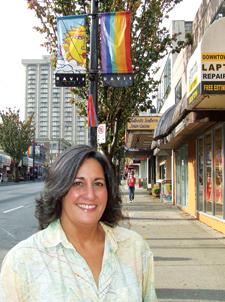Under the banner Live-Love-Be, delegates from queer Pride groups worldwide will meet in Vancouver for the 27th annual InterPride Conference running from Oct 23-26.
The theme, chosen by InterPride’s members, embodies the sentiment at the centre of much queer and trans activism: “Let us live, let us love, and let us be,” says conference chair Caryl Dolinko. “It’s as simple as that.”
Based in the United States, InterPride brings together the not-for-profit organizations that host pride parades, festivals and other cultural events celebrating sexual and gender diversity. The conference itself has two main functions, explains InterPride co-president Russell Murphy. The first is business meetings, and “the really big one” which, he says, is “a time to get together and learn from each other.”
Yearly InterPride dues are calculated according to the member organizations’ budgets so that emerging groups like EQUAL GROUND of Sri Lanka and Mozaika of Latvia can share ideas and experiences with the people behind some of the world’s largest Pride celebrations.
Although the Vancouver Pride Society (VPS) was host to over 500,000 people at this year’s Pride parade, Dolinko says concerns about the complexity of running the multi-day, international conference made them hesitant.
“Unfortunately, most of the conferences have lost money,” she admits, naming financial risk as one reason why, while supporting the bid as the InterPride member organization representing Vancouver, the VPS had “no involvement whatsoever” in planning the conference.
Instead the Vancouver InterPride Conference Society, which unlike the VPS is not membership-based, has been working for over two years to put conference’s events together.
While having secured sponsorship from big names like Molson, Starbucks, and Gay.com, Dolinko cites the generosity of the entertainers and speakers who have waived their booking fees to participate as crucial to the success of the conference. Even Pride flag creator Gilbert Baker and world-renowned tennis veteran Martina Navratilova have agreed to appear pro bono, she says.
Navratilova will be speaking about the Rainbow Endowment, a philanthropic organization she founded in 1993. She will also receive a Pioneer for Pride award for her commitment to queer activism at the conference gala.
“She has stood very proud and not backed down,” says Dolinko of the multiple Wimbledon champion. “She was never ashamed, she never hid.”
This message of Pride, especially in the face of adversity, is central to Dolinko’s vision of the conference.
“Pride for a lot of people is just a big party, a big ol’ weekend to get loaded or whatever, and that’s terrific,” Dolinko notes. But she says she worries about complacency.
“You need to continue standing up,” says Dolinko, “if not for yourself, then for your community. And if not for your community, then the global community of our LGBT family.”
She reminds that roughly 80 countries maintain the criminalization of homosexual activity. And in seven, out queers may face the death penalty.
“Until all of them have the same rights that I have here in Canada,” Dolinko says, “we’re not doing our job.”
Finding common ground among such disparate experience is “not always easy,” says Murphy. “Those of us especially in North America are event producers,” he says, “and you get to people like in Eastern Europe where they are jailed or Africa where they’re killed, or the Middle East or other countries where it’s not even spoken yet. It’s vastly different.”
“I think we have to look at our history to find the common ground,” Murphy suggests. “The ways some people are being treated is the way that we were treated 30 or 40 years ago.”
For younger North American and European queers who may not have firsthand experience fighting for tolerance, he adds, “it’s even harder. The unfortunate thing is a lot of queer history is not written, it’s lost and it’s not passed down.”
Vancouver’s queer history is now under a community-based archival process undertaken through Out on Screen’s Queer History Project online.
InterPride 2008 will also undertake some strategies aimed at making the event environment-friendly.
“We’re trying to make this conference as green as possible,” says Dolinko, which she says includes requesting the venue to provide pitchers of water instead of individual bottles, and asking delegates to use computers instead of paper whenever possible.
And with an eye to the financial future of the conference, Dolinko says this year attendees can help augment InterPride’s funding pool.
In addition to the yearly contributions of attending organizations to the InterPride scholarship fund, Dolinko says a silent auction of items brought by the visiting delegates will contribute directly to helping delegates from under-funded organizations attend future conferences. This year, according to Murphy, InterPride awarded over US$17,000 in grants to 11 visiting organizations.
Along with Navratilova and Baker, former Vancouver mayor Larry Campbell and local trans activist Roz Shakespeare are also scheduled to speak at the four-day event.
Though tickets for the weekend’s workshops range up to $675 for non-members, Vancouverites on smaller budgets can take part in the conference in a few ways. Local sponsor Celebrities Nightclub will be hosting a welcome reception that includes performances by Symone, Vivian Von Brokenhymen and Truly Tina.

 Why you can trust Xtra
Why you can trust Xtra


